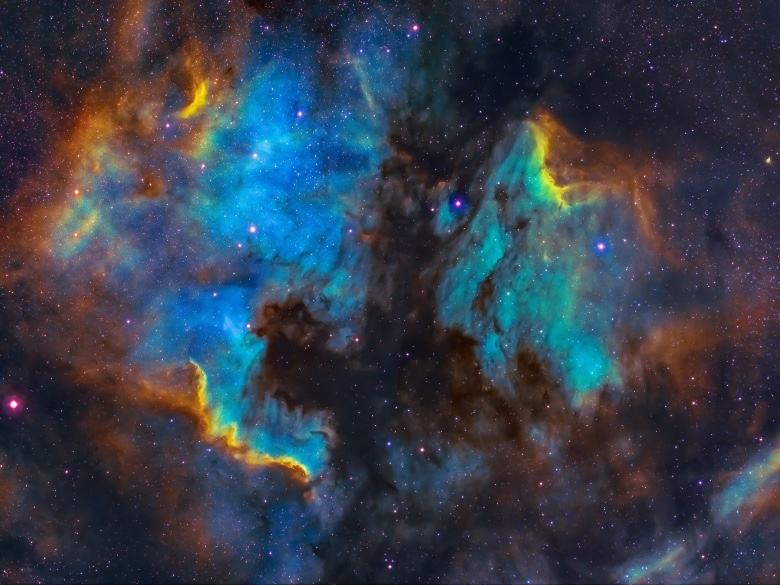
The universe that surrounds us is fascinating. Most scientists today calculate the size of the observable universe to be around 92 to 93 billion light-years across. When we start measuring distances in light years instead of miles, we’re already in the territory about which we have almost no experience or frame of reference.
Based on our understanding of what we observe in the universe beyond our solar system, it’s possible that there could be more than 5.3 trillion other planets that could potentially support life, which is about 5.3 trillion more than most observers thought existed when Jesus walked the earth.
It’s no wonder Gene Roddenberry, when he created Star Trek, chose to open every episode with the familiar narration, “Space: the final frontier.”
As much as I love to geek out reading the latest findings of astronomers, space isn’t actually what I consider the final frontier; faith is. Why? Because, no matter the extent of our discoveries, faith can always ask the simple question, “What else is there?”
Faith: Forever the Final Frontier
We’re living in a culture that often pits faith and science against each other as though the discoveries we make about the age, size, and nature of our universe will somehow threaten to demolish the fortresses of religious faith. But that’s only true if we believe that faith somehow predates science.
This error is often made by both believers and nonbelievers alike. Just as we describe human history by its ages and eras (the Stone Age, the Bronze Age, the Iron Age, etc.), we often divide the history of religion and philosophy in the same way. This leads us to the logical conclusion that in the “Age of Faith,” we needed to construct explanations for our origins that are being rendered obsolete in the “Age of Science” in which we are collecting rational, testable explanations for everything.
But what if faith and science are more like train tracks, running alongside each other throughout every unfolding moment in the history of humanity? If so, every new scientific discovery would lead us to ask, by faith, what else is there beyond this? And every new stage of development in our faith would drive us back, with deep curiosity, to scientific exploration of all that is or ever shall be.
While we are living in an exciting age of scientific discovery, we are also, unfortunately, observing an exodus of people from organized religion. There are all kinds of reasons for this that I will address in future columns, but for now, I’ll simply lament the decline of Christianity in some regions of the world. I wish it weren’t so.
Embracing the Mystery of God
Personally, I follow Jesus, through whose life and ministry God has made himself known more perfectly. As Dallas Willard so eloquently put it in his timeless classic, The Divine Conspiracy: Rediscovering Our Hidden Life in God:
Jesus came among us to show and teach the life for which we were made. He came very gently, opened access to the governance of God with him, and set afoot a conspiracy of freedom in truth among human beings. Having overcome death he remains among us. By relying on his word and presence we are enabled to reintegrate the little realm that makes up our life into the infinite rule of God. And that is the eternal kind of life.
As a believer in and follower of Jesus Christ, I welcome and embrace the Mystery of God, which is always unfolding before me. Around every turn, beyond every new discovery, and on the other side of every hard question I’ve asked (and I’ve asked a lot of them) is another mile of the endless frontier of faith.
The more I learn, the more I realize just how much I don’t know. The more I believe I’ve grown in my faith, the more I realize I’ve only just begun this journey.
A Solidly Inflexible Faith
Truthfully, it’s possible to have a faith that is so “solid” that it is inflexible, and therefore breakable and brittle when pressure is applied from an unexpected direction.
We see this with so many young adults who grew up in fundamentalist traditions where the message was that any threat to biblical literalism would be a threat to their faith. When presented with overwhelming evidence of the inadequacy of biblical literalism in the face of scientific discovery, too many have abandoned their faith, but understandably so, in light of the material out of which it was constructed, to begin with.
When our faith is inflexible, every new idea is a threat, every question is scary, and relationships with those whose faith isn’t made of the same material as ours are always suspect.
A faith that is flexible, on the other hand, can absorb the shock of suffering more resiliently. A flexible faith welcomes questions as opportunities for deeper exploration of the God of all of history and all people, not just of our own little sliver of religious tradition. A flexible faith is much harder to break.
As Pete Enns puts it in his book, The Sin of Certainty: Why God Desires Our Trust More Than Our “Correct” Beliefs,
Rather than being quick to settle on final answers to puzzling questions, a trust-centered faith will find time to formulate wise questions that respect the mystery of God and call upon God for the courage to sit in those questions for as long as necessary before seeking a way forward.
In the end, a faith that is willing to flex with each new discovery about the mysteries of God, life, and the universe is far less likely to fail us.
Photo by Aldebaran S on Unsplash.












